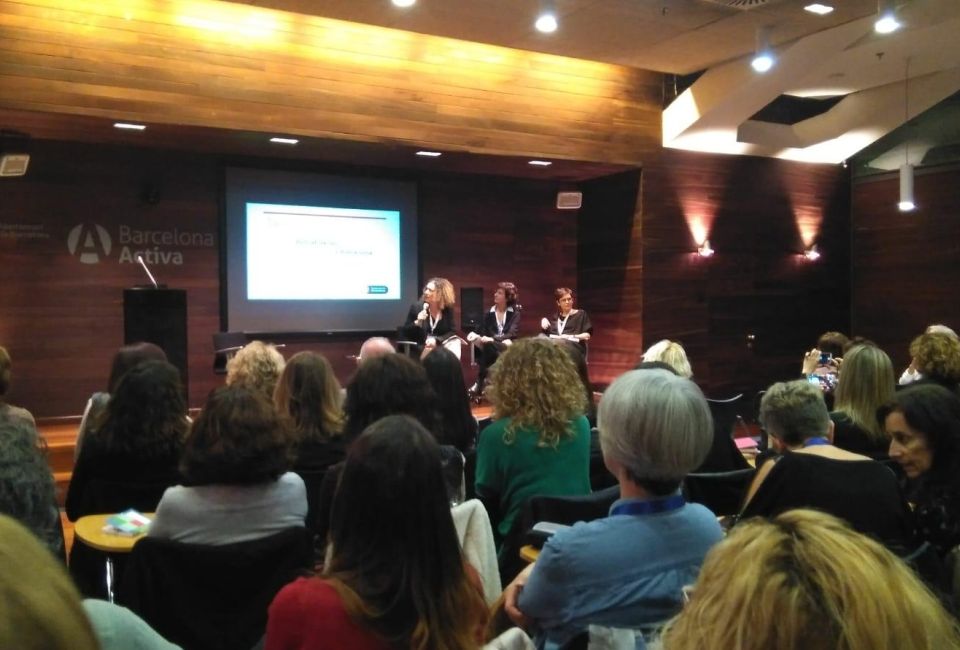
Researchers at the UVic-UCC publish a study that outlines and considers the future challenges for women entrepreneurs in Barcelona
Low confidence in their own abilities, a lack of shared responsibility in housekeeping and child-rearing tasks and a lack of support from the people around them are some of the factors that limit women when establishing their own business. Although the number of female entrepreneurs in Barcelona has increased in recent years, the percentage of female freelance workers is 39%, which is clearly lower than the number of men. These are some of the figures and conclusions provided by the study "El retrat de les dones emprenedores de Barcelona" [A portrait of women entrepreneurs in Barcelona], authored by the doctors Anna Pérez-Quintana and Anna Sabata-Aliberch and the researchers Patrícia Illa and Judit Solà. The study was produced under the auspices of the Faculty of Business and Communication Studies and the research groups SoPCI (Society, Politics and Inclusive Communities) and Emprèn at the University of Vic - Central University of Catalonia (UVic-UCC). It was presented last Monday, on International Women's Entrepreneurship Day, at a seminar organised by Barcelona Activa, the organisation that commissioned the research.
The study looked at women who own businesses in the city of Barcelona, in order to enhance knowledge of their business activities and to identify their specific needs in the process of creating and consolidating their business. This information identified the main weaknesses of this group, and enabled challenges to be established and improvements proposed. "Without visibility, without being able to quantify or describe the group, it is more difficult to implement specific promotion and support policies," explains Anna Pérez-Quintana, who describes women entrepreneurs as an "invisible group".
A balance between vocational entrepreneurship and entrepreneurship due to necessity
According to the researchers, this invisibility is highlighted by the difficulty in finding statistical data about female entrepreneurship from both official and unofficial sources. Nevertheless, the study contains figures from various primary and secondary sources that provide partial but complementary views of the group, as well as in-depth interviews with a total of 30 entrepreneurs and experts in training, support and business networks. According to the study, women register as freelance workers at around 36 years old, and remain so for an average period of 7.8 years. The average age of freelance women in Barcelona is 46 years old, and most have completed secondary or higher education. While female entrepreneurs have a greater tendency to register as freelance workers, male entrepreneurs are more like to establish trading companies. Their reasons for entrepreneurship also differ: 64% of men say that they do it because of opportunities, i.e. "to grow professionally and increase their income level" while equal proportions of women report vocational entrepreneurship (36%) and entrepreneurship due to necessity (31 %), i.e. "to achieve a modus vivendi, often as a result of difficult financial situations and unemployment," explain the authors of the paper.
The study recalls that in the field of entrepreneurship, "the gender inequalities prevailing in society as a whole are reproduced, particularly when the stereotypes associated with entrepreneurs are clearly masculine." Women entrepreneurs create businesses mainly in the services sector, aimed above all at consumers, such as retail, hospitality, and the culture, tourism and leisure sector. They begin projects at a local level, and unlike men, their presence in technological fields and in the creation of start-ups is limited. Meanwhile, the study says that "the ongoing need for constant training conceals insecurity and fear, and increased prudence leads to fewer future opportunities for business growth." The research suggests that "the tendency to limit subcontracting of ancillary services often leads to overloads of work, which often entail a transition from self-employment to what is known as self-exploitation."
Challenges and recommendations
Based on this analysis, the researchers point to a number of challenges, including the need to increase the data available on female entrepreneurship, to work on limitations such as social pressure and low confidence in their own abilities, and to improve knowledge of the existing resources providing support for women entrepreneurs. For this reason, the concluding recommendations of the study include the establishment of a female entrepreneurship observatory, investments in education in this field at both schools and universities, a focus on entrepreneurial skills that are not characterised by gender (innovation and creativity) and the creation of an Entrepreneurial Women's Service Point which organises, hosts and provides information about the resources and tools available.
Monday's seminar also included discussion and active networking groups, followed by a debate. The director of Barcelona Activa, Sara Berbel, referred to the data in the study when calling for the threshold of 30% of women entrepreneurs in Catalonia, a figure that is now 33%, to be surpassed.